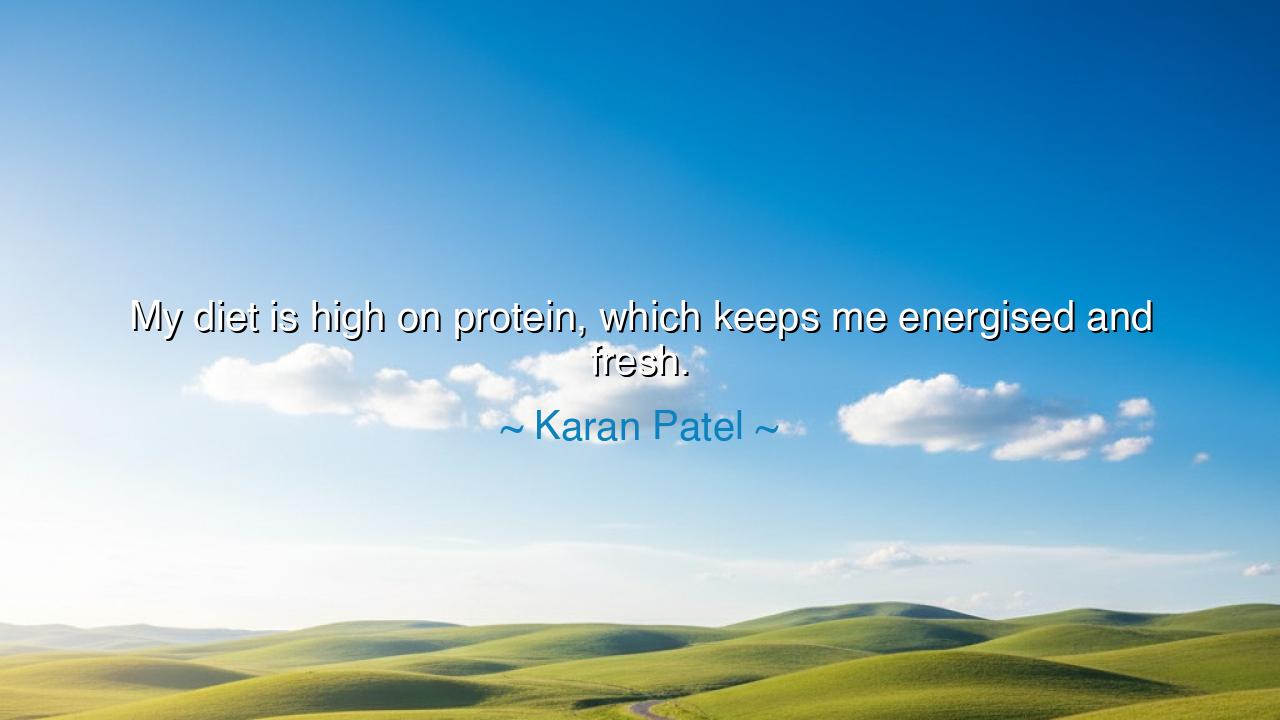
My diet is high on protein, which keeps me energised and fresh.






"My diet is high on protein, which keeps me energised and fresh." These words, spoken by Karan Patel, offer a powerful reminder of the ancient wisdom that the body must be nourished with purpose and clarity. Patel’s choice to emphasize a high-protein diet speaks not only to the practicalities of maintaining energy and vitality, but also to a deeper understanding of how nourishment shapes the body and spirit. Protein, as the foundation of muscle, strength, and endurance, is a cornerstone in the practice of building both physical power and mental clarity—concepts that have been revered by the greatest thinkers of antiquity.
In the ancient world, the Greeks and Romans were keenly aware of the connection between diet and vitality. Hippocrates, the father of medicine, taught that food was not just sustenance, but medicine for the body and the soul. He believed that the right balance of nourishment could lead to long-lasting health and mental sharpness. Protein, in particular, was understood to be a vital source of energy, necessary for strength, endurance, and healing. Hippocrates would have seen Patel’s choice as an intuitive decision to feed the body with the right fuel, ensuring that it remained energized and ready for whatever challenges lay ahead.
The example of Spartan warriors offers a vivid image of how protein was used to build not just strength but an unyielding spirit. The Spartans, revered for their discipline and military prowess, ate simple, nutritious meals designed to build muscle, maintain energy, and support long, grueling campaigns. They did not indulge in excess, but in the foods that would serve them most effectively—lean meats, vegetables, and simple grains. This ancient approach mirrors Patel’s commitment to a protein-rich diet, as it emphasizes the nourishment needed to stay energized, alert, and strong. Just as the Spartans chose food for its ability to fuel the body for battle, so too does Patel choose protein to fuel his body for the demands of daily life.
In the same way, the great Roman general and statesman Julius Caesar understood that strength—whether physical, mental, or spiritual—required constant care of the body. Caesar’s soldiers, who fought under grueling conditions for extended periods, relied on a diet that was simple but focused on sustenance and energy. Their meals, often composed of protein-rich foods like meats and legumes, provided the fuel they needed to endure the toughest challenges. Caesar himself was known to be a disciplined leader, and his commitment to maintaining his soldiers’ health was one of the reasons for his military success. Patel’s approach to high-protein eating resonates with this ancient tradition—recognizing that sustenance and energy are integral to both personal and collective achievement.
Yet, the wisdom behind Patel’s choice to prioritize protein over other forms of nourishment is not just about physical strength. In the ancient Stoic tradition, philosophers such as Epictetus and Marcus Aurelius taught that discipline in all things—whether in diet, exercise, or thought—was necessary for a clear mind and a strong will. Aurelius, in particular, often spoke of the need to maintain balance in all things, including what we consume, because our physical health directly affects our mental clarity. Protein, in its simplicity and potency, is not just about muscle; it is about maintaining a foundation for mental sharpness and endurance. Patel’s diet, which keeps him energized and fresh, reflects this Stoic principle: a body well-fed with the right food leads to a mind well-prepared for any challenge.
The deeper lesson in Patel’s words is clear: sustenance is not about fleeting indulgence, but about purposeful nourishment that supports both strength and clarity. Protein, a building block for the body, offers the energy needed to face life’s challenges with resilience, but it must be paired with discipline and intentionality. Just as the ancients revered balance in all things, we too must approach our diet with the understanding that the food we consume should align with our goals—whether those goals are physical, mental, or emotional. By eating with purpose, we not only support our strength but also fuel our resolve to live with intention.
In practical terms, Patel’s words challenge us to consider the food we eat as not just fuel for survival, but as the very nourishment that drives our ambitions. We must recognize that protein-rich foods, which sustain our bodies and support our energy, are essential for maintaining the strength to pursue our highest goals. Whether we are training for physical prowess, navigating the challenges of daily life, or pursuing intellectual and emotional growth, we must choose the foods that serve us most effectively—those that provide sustenance and vitality, rather than those that merely offer momentary pleasure or indulgence.
Thus, the lesson of Karan Patel is not simply about diet, but about a philosophy of nourishment that honors both the body and the mind. Like the warriors, philosophers, and leaders of the ancient world, let us commit to fueling our bodies with the right foods, embracing a high-protein diet that sustains us physically and mentally. In doing so, we build a life that is strong, focused, and energetic, enabling us to meet the challenges ahead with the courage and clarity of a well-nourished soul. Let us live with the wisdom of the ancients, choosing the food that supports the fullness of our lives, and allows us to reach the heights of our potential.






AAdministratorAdministrator
Welcome, honored guests. Please leave a comment, we will respond soon